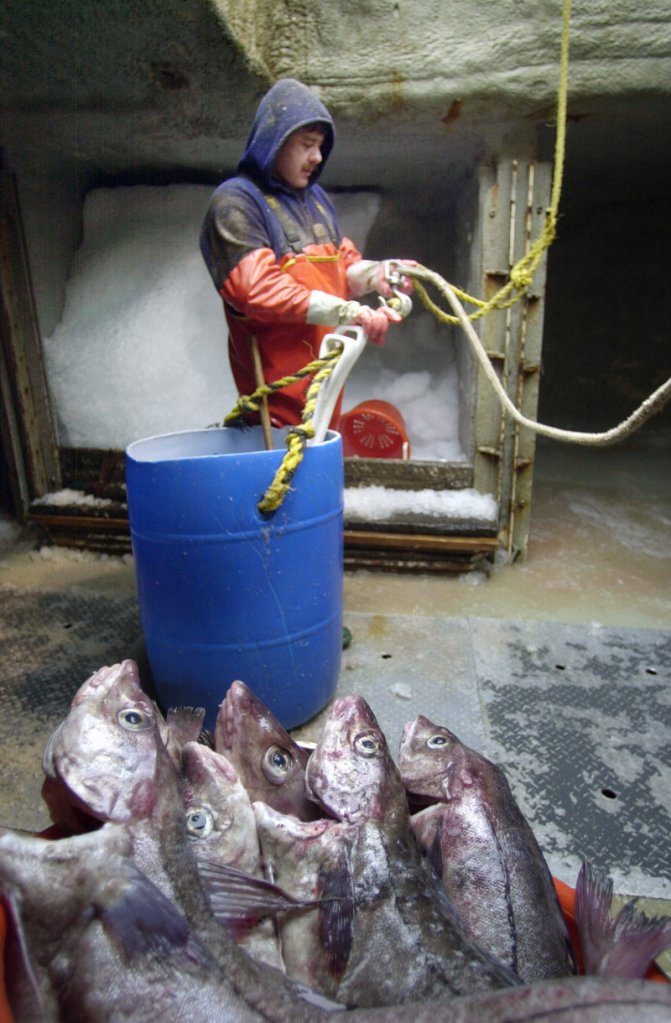BRUNSWICK – As I sat at last Wednesday’s New England Fishery Management Council meeting in Portsmouth, N.H., hearing countless fishermen share their concerns about the uncertain future of their industry, the words of one fisherman from New Hampshire played over and over again in my mind:
“It’s midnight and getting darker.”
Many fishermen testified that the new limits would put them out of business and harm their families. Scientists reported that not reducing the catch drastically would put the Gulf of Maine cod stock at risk of a population crash from which it might not recover.
They’re both right. But pinning blame on either fishermen or resource managers isn’t going to help us solve this problem.
Council members faced an incredibly difficult choice, and I applaud them for making a brave decision.
Ultimately, the council voted to cut the annual catch for cod in the Gulf of Maine by 77 percent, with the new regulations to take effect May 1. At the same time, the annual catch on Georges Bank, where the cod population is struggling to recover from severe depletion, will be cut by 55 percent.
We are painfully aware of the hardships these quota cuts will have on fishing families throughout New England. But it is important for all of us to recognize that the root cause of this crisis is the persistent lack of fish to catch in so many parts of the Gulf of Maine.
Cod has long been the foundation of New England’s fishing industry. It fueled Viking travelers, and both fortunes and communities were built on the backs of millions of cod. But today, all indications are that cod are in a lot of trouble.
Stock assessment models estimate that cod are populations are at a fraction of healthy, sustainable levels. Federal trawl survey data from 2011 and 2012 indicated some of the lowest cod catches in more than 40 years. And fishermen in the Gulf of Maine, whose livelihoods depend on finding codfish, have caught only half of the allowable catch this year.
We fully recognize that the Gulf of Maine is a complex and dynamic system, and computer models and survey tows are far from perfect.
The waters of the Atlantic are warming. Basic biological productivity is changing. And in response, complex predator-prey relationships are constantly evolving. To adapt to these changes, we must all commit to improving the science upon which stock assessments and allowable catch levels are based.
We can make the science better, and I believe that the fishermen who spend their lives on the water need to play a greater role.
When I heard some of these fishermen calling for a complete closure of the fishery at the council meeting last week, I realized just how dire the situation has become. When both the best available science and the experience of local fishermen are lining up to tell us that cod are in trouble, we need to act.
For our part, The Nature Conservancy has worked with fishermen and other partners for several years because we are committed to being more than an interested bystander. We became a stakeholder in this fishery by acquiring groundfish permits, and have used them to support collaborative research with fishermen and to help secure long-term access to the fishery.
Over the past four years, we have worked directly with fishermen from the Port Clyde Community Groundfish Sector and the scientists at the Gulf of Maine Research Institute, testing modified trawl gear and gill nets that allow fishermen to be more selective in their catch. We have also supported the Penobscot East Resource Center’s sentinel fishery survey, which aims to improve our understanding of the relative abundance and distribution of groundfish, like cod, in eastern Maine.
Collaborative approaches like these are the best way to find solutions that work for the fish and the fishermen. Given the deep cuts announced last week, we are going to need even more of them if the New England groundfish fleet is going to survive.
It may be midnight, and it may in fact, be getting darker for the New England groundfish fishery, but that does not mean it is time to turn out the lights and go home.
It means it is time to do whatever we can to minimize the short-term economic impacts to our fishing communities and redouble our efforts to improve the science and monitoring efforts on the water.
There is no silver-bullet solution to solve all these challenges, but I, for one, am confident that if conservation groups, fishermen, scientists and managers commit to working together, we can figure out a way to weather this current storm.
Mike Tetreault lives in Bath and is executive director for The Nature Conservancy in Maine.
Send questions/comments to the editors.



Success. Please wait for the page to reload. If the page does not reload within 5 seconds, please refresh the page.
Enter your email and password to access comments.
Hi, to comment on stories you must . This profile is in addition to your subscription and website login.
Already have a commenting profile? .
Invalid username/password.
Please check your email to confirm and complete your registration.
Only subscribers are eligible to post comments. Please subscribe or login first for digital access. Here’s why.
Use the form below to reset your password. When you've submitted your account email, we will send an email with a reset code.